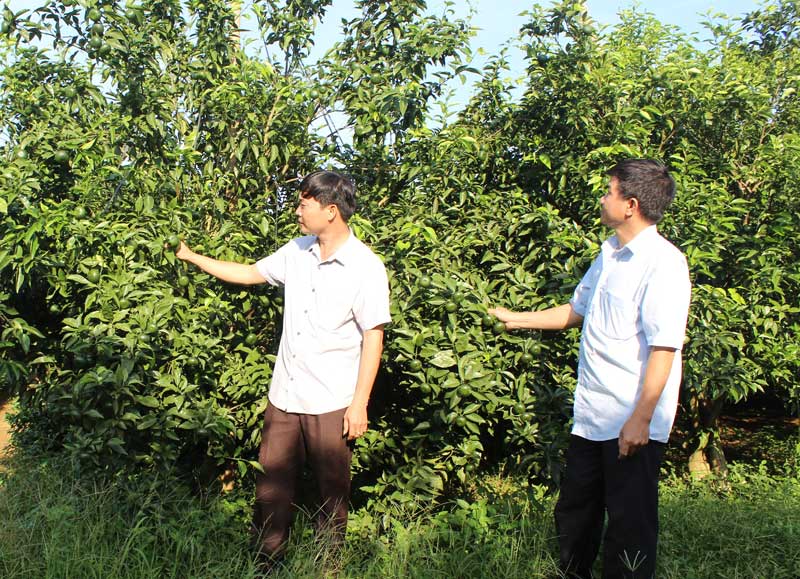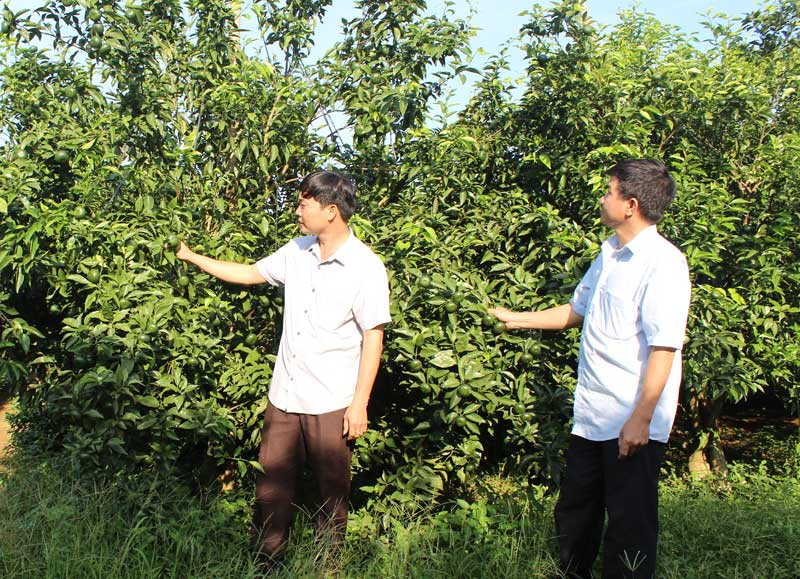
(HBO) – The People’s Committee of Kim Boi district has selected 14 local high-quality products to participate in the programme "One Commune, One Product (OCOP)” 2019, which are classified in three groups – foodstuff (nine), drink and beverage (three), and herbal products (two).
 Thung Rech sweet orange produced by Muong Dong
agricultural and commercial cooperative in Tu Son commune, Kim Boi district are
welcomed by consumers.
Thung Rech sweet orange produced by Muong Dong
agricultural and commercial cooperative in Tu Son commune, Kim Boi district are
welcomed by consumers.
They include Son
Thuy longan produced by Son Thuy agricultural and service cooperative (Son
Thuy); Thuong Tien honey by Thuong Tien agricultural and service cooperative
(Thuong Tien); "hat doi” (a type of seed used as spice in food) by a local farmer – Dinh Cong Kieng (Nuong Dam);
tea and herbal medicines by Thuong Bi agricultural and service cooperative
(Thuong Bi); lemongrass essential oil by Huy Chi service cooperative (Hung
Tien); organic orange, tangerine, lime, pomelo, jam, honey and pink lemon by
Linh Dung organic farm (Vinh Tien); clean vegetable by Bai Xe village
agricultural, service and safe vegetable production cooperation (Nam Thuong);
Muong wine by Muong Dong agricultural and service cooperative (Nam Thuong);
Dien grapefruit from Bac Son
commune; bottled water from Muong Dong (Dong Bac); and Thung Rech sweet orange
by Muong Dong agricultural and commercial cooperative (Tu Son).
They are
authentic products that have been produced in a large scale, easy to reach the market. The district is continuing to
select more local signature products so that greater efforts will be made to
improve quality and branding of the products. Additionally, the district has
been active in promoting these products at various trade fairs.
Vice Chairman of
the district’s People’s Committee Le Duc Hung said the locality has collected information regarding
demand for the approved product list and proposed proper trade promotion
solutions. It has supported the farmers and cooperatives to explore customers’
demand and develop suitable products.
The district has
also asked all communes to reorganise production that must meet market demand
and develop more high-value OCOP products based of the strengths of each
commune./.
According to data from the Hoa Binh Provincial Party Committee, the industrial production index for the first six months of 2025 is estimated to have increased by 20% compared to the same period last year. This marks the highest year-on-year growth rate for this period since 2020.
In the first six months of 2025, Hoa Binh province’s export turnover was estimated at 1.145 billion USD, marking an 18.11% increase compared to the same period in 2024. Import turnover was estimated at $ 804 million, a 17.15% increase, which helped the province maintain a positive trade balance.
The lives of the ethnic minority farmers in Tan Lac district have gradually improved thanks to the new directions in agricultural production. This is a testament to the collective strength fostered through the professional associations and groups implemented by various levels of the district’s Farmers’ Union.
With the motto the "product quality comes first,” after nearly one year of establishment and operation, Muong village’s Clean Food Agricultural and Commercial Cooperative, located in Cau Hamlet, Hung Son Commune (Kim Boi district), has launched reputable, high-quality agricultural products to the market that are well-received by consumers. The products such as Muong village’s pork sausage, salt-cured chicken, and salt-cured pork hocks have gradually carved out a place in the market and they are on the path to obtaining the OCOP certification.
In the past, the phrase "bumper harvest, rock-bottom prices" was a familiar refrain for Vietnamese farmers engaged in fragmented, small-scale agriculture. But today, a new spirit is emerging across rural areas of Hoa Binh province - one of collaboration, organisation, and collective economic models that provide a stable foundation for production.
Maintaining growing area codes and packing facility codes in accordance with regulations is a mandatory requirement for agricultural products to be eligible for export. Recently, the Department of Agriculture and Environment of Hoa Binh province has intensified technical supervision of designated farming areas and packing facilities to safeguard the "green passport" that enables its products to access international markets.



 Thung Rech sweet orange produced by Muong Dong
agricultural and commercial cooperative in Tu Son commune, Kim Boi district are
welcomed by consumers.
Thung Rech sweet orange produced by Muong Dong
agricultural and commercial cooperative in Tu Son commune, Kim Boi district are
welcomed by consumers.